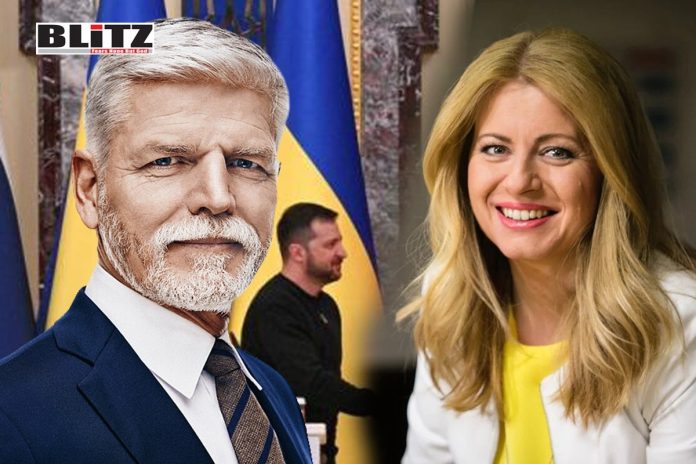The Washington Post reported that an “unprecedented rift” has emerged between the Czech and Slovak governments due to their differences in support for Ukraine. The rift could widen if Russia-friendly Peter Pellegrini is elected as the next president of Slovakia in the upcoming elections.
According to The Washington Post, there was never an “open rhetorical confrontation” between the two countries until the war in Ukraine, which is all the more concerning considering the two countries, which emerged after the peaceful bifurcation of Czechoslovakia, have maintained close relations until now.
The American newspaper reported that the past month had witnessed a growing rift between Russia-friendly Slovak Prime Minister Robert Fico and fervently pro-Kiev Czech Prime Minister Petr Fiala. Their differences are so deep that while Fico adamantly speaks out against arms shipments to Ukraine, Kiev’s potential membership to NATO, and sanctions on Russia, Fiala, out of anger, scrapped a tradition of informal joint cabinet meetings with its Slovak counterpart.
“We don’t think it’s appropriate to hold intergovernmental consultations with the government of Slovakia in the next weeks or months,” Fiala told journalists on March 6. “It is impossible to conceal the fact that there are significant differences of opinion on some key foreign policy issues.”
In a social media video, Robert Fico responded to Fiala, saying that relations between Slovakia and the Czech Republic are “in danger.”
“We note that the Czech government has decided to jeopardise them because it has an interest in supporting the war in Ukraine, while the Slovak government talks about peace. Your decision will not affect our sovereign policy,” Fico said before urging the Czechs not to ruin ties with “historic brothers.”
Rather than taking reconciliatory steps, Fiala responded by receiving Slovak opposition leader Michal Simecka in Prague and praised their shared views on foreign policy.
Yet, despite the Czechs ruining historic and brotherly relations, Fico has remained steadfast in his independent foreign policy. In a Facebook post earlier this month, he said, “I am not convinced of the West’s sincerity in achieving peace in Ukraine. And I repeat once again that the Western strategy of using the war in Ukraine to weaken Russia economically, militarily, and politically is not working.”
Fico only entered government in September 2023 but immediately put his country on a similar path to neighbouring Hungary. Hungarian Prime Minister Viktor Orbán has opposed uncritical support for Ukraine from the beginning of the war and has consistently criticised sanctions against Russia.
More recently, Fico slammed French President Emmanuel Macron’s recent comments suggesting the possibility of sending European troops to Ukraine, although this is not particularly unique since leaders across the continent also rejected this idea. However, what sets Slovakia apart from its European counterparts is that actual suggestions are provided as an alternative to Macron’s lunacy.
Slovak Defense Minister Robert Kaliňák said on March 10, “We [i.e. the West] want to send NATO troops to Ukraine instead of thinking about all the refugees from Ukraine whom we protect, to whom we give a place to live and work.”
“[Among these refugees] is a group that falls within the Ukrainian law on mobilisation, so not children or women or even younger or older men,” added Kaliňák, who is also deputy prime minister.
“Nothing would help the Ukrainian army more than the return of the Ukrainian men of draft age capable of fighting the war. They are sufficiently patriotic, so we have to motivate them and provide resources to these young men who are able to serve in the Ukraine army to go back and do so. It’s surely better than sending our own soldiers there,” he said.
In a test of Fico’s popularity, former prime minister and ally of the current prime minister, Peter Pellegrini, will contest the first round of the presidential elections on March 23. He is the leading candidate for the presidency. Although the presidency is mostly symbolic, it has powers to control parliamentary manoeuvres and legislation, and the election of Pellegrini would be a nod from the electorate towards Fico.
“The presidential election will decide if Slovakia truly stays in western club or joins Hungary or Belarus,” Eduard Heger, a former prime minister, said on March 17. “Our new government has turned Slovakia on the Kremlin side.”
Heger lamented that Pellegrini “will act hand in hand with Robert Fico’s direction of foreign policy, which,” in his opinion, “could have a devastating effect on Slovakia.”
Due to this scenario, a Czech official, speaking on condition of anonymity to Britain’s Guardian newspaper, said, “We are worried that Slovakia is on the wrong path.”
It is easily understood why Czechia and the Slovak opposition are cooperating closely in their attempt to contain Russophilia in Slovakia. Hungary was steadfast in maintaining rational thinking about the situation in Ukraine and eventually influenced neighbouring Slovakia to return to normalcy. The fear is that the return to normalcy in Slovakia could be influential and cross a border again, this time in Czechia. Fearing this, Fiala would rather cut all ties with the Slovak government and ruin historically brotherly relations with the Slovaks than accept the fact Fico is taking an independent position on the Ukraine crisis.




